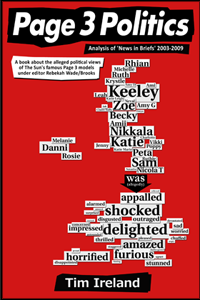This entry was posted on
Thursday, April 9th, 2009 at
2:22 pm and is filed
under The War on Stupid.
I’m not anti-police, as some right-wing scribblers have been claiming or implying.
I’m anti-kettling, certainly, but not anti-police.
But if I’m to retain faith in the Met or any other British police force, then I need to see that the police officers who are responsible for all improper policing at the G20 event can and will be called to account… i.e. not just those who, like Bob Quick, cannot expect any slack from a certain party in opposition. For some reason.
I am genuinely concerned about statements fed to the media by the police that appear to be either prone to misinterpretation, somewhat embellished, lacking in certain key facts, or outright lies.
I am alarmed to think that political pressure is required to prompt even simple suspensions when video footage emerges of police attacking a man from behind and without provocation.
I’m merely disappointed that the officers involved didn’t come forward until after the video came to light, but I am incensed that the reasons they could not be identified by their own superiors (including hidden faces and obscured badge numbers) are not being treated as major issues themselves.
(Psst! I asked a blogging G20 police offer in what circumstances he would regard it to be appropriate for an officer to obscure their badge number. The mix of evasion and implication in his response is less than comforting.)
It worries me that nothing would have been done about this without the video evidence that police appear to have tried to collect/delete or preemptively suppress, especially when – without it – we had media commentators like Iain Dale dismissing the allegations of police violence out of hand and even making a joke about it being such a non-story that the only person in for a battering that day would be Jacqui Smith (ha-ha, let’s all laugh at the dead man get back to the £10 porn scandal and other news that matters).
Even with the video evidence, Tomlinson failed to rate anything but a passing mention in most newsapers yesterday. Blame the tight deadlines if you like, but the fact is that the Bob Quick story first appeared at almost exactly the same time yesterday (7pm) as the Tomlinson video did the night before (6pm), but Tomlinson only made the front page of the Guardian the next day.
Today, Quick’s predicament makes the front pages on… well, pretty much every front page (including the Daily Mail, Express and Telegraph, The Times, the FT, the Mirror and The Sun).
Meanwhile, right-wing bloggers are still busy making out that Tomlinson was asking for this in some way (for being drunk, uncooperative, “very much part of the protest” etc.), and – in the same fucking breath – chiding ‘lefties’ for daring to draw any parallels to Jean Charles de Menezes.
(Let’s leave aside for the moment those who scoff from their ivory towers and hold fast to the quite ridiculous notion that participation in pretty much any protest not involving the Countryside Alliance warrants a head-kicking.)
In short, we are being cheated by old media and the ‘leading bloggers’ who claim to be a viable alternative.
Further, now we have the IPCC marching into the offices of the Guardian calling for the removal of this vital evidence from their website:
The Guardian – Policing: Death and denials
In the course of this there must be an account of why, from the moment of Mr Tomlinson’s death, the police misled the news media, and in some cases lied, about what happened. The Metropolitan police’s duty of truthfulness failed on 1 April. Statements were issued on and off the record about the Tomlinson incident, omitting details that must have been known to the police and including false claims. Police representatives subsequently tried to stop reporters doing their jobs, misrepresenting the views of the Tomlinson family. The IPCC misled the media about the case too. And what kind of independent body is it whose first reaction to the Guardian’s evidence on Tuesday night was to call at our offices (accompanied by a City of London policeman) and ask for it to be taken off the website? It is not hard to fear that the pressures encouraged the police to minimise and even deny the truth of what happened to Mr Tomlinson and then to resist, not promote, attempts to reveal it. Either way, the police lost sight of their priorities.
Three essential things should now follow. The first is that the upgraded investigation must provide an authoritative and comprehensive account of Mr Tomlinson’s final minutes, drawing on all available evidence, including police CCTV evidence, and placing it in the context of the G20 policing strategy. The second is that anyone suspected of a crime arising from the investigation into Mr Tomlinson’s death should have to answer for it in court. And the third is that the wider lessons about the policing of public order, the police’s media strategy during emergencies, the working of the police complaints system, and the implications for police training must be learned and systematically applied. The best way to deal with these wider issues is for the home secretary to appoint a judicial inquiry. Remember Mr King’s words. That was not correct policing.
JackP of The Pickards has a post along similar lines, with bolder objectives…
JackP – Ian Tomlinson: Metropolitan Police kill innocent man AGAIN
But more than anything else, the words of the Chairman of the Metropolitan Police Federation, have proved to me that the Met Police aren’t actually capable of policing.
“On a day like that, where there are some protesters who are quite clearly hell-bent on causing as much trouble as they can, there is inevitably going to be some physical confrontation. Sometimes it isn’t clear, as a police officer, who is a protester and who is not. I know it’s a generalisation but anybody in that part of the town at that time, the assumption would be that they are part of the protest.” – Peter Smyth, quoted on BBC News
Peter here quite rightly identifies that some protesters were causing trouble. He then suggests that the police mis-identified Ian Tomlinson as a protester, and that’s why they struck him. What? Peter Smyth’s quote would lead me to believe that he thinks it is okay for the police to baton-strike any protester and hurl him to the ground, whether or not he is actually breaking the law. In the views of the Chairman of the Metropolitan Police Federation, protester = criminal, and striking Ian, had he been protesting, would have been perfectly legitimate.
That flagrant disregard for the rights of peaceful protesters sums up the Met’s actions.
Jean Charles de Menezes. Ian Tomlinson. That could have been you. That could have been your brother, your father, your friend. Next time it might very well be you or someone you care about, unless we take action to prevent a ‘next time’. Justice must be done, as opposed to the usual response of ‘covering up for police brutality’.
So I’d like to propose my solution.
1. Firstly, any member of any police force found to have lied about police action (or protester action) to be sacked. If this person can demonstrate that they were given incorrect information, then that will be a reasonable defence — provided they can identify who gave them that information, so they can be sacked.
2. Secondly, any member of any police force found to have used violence on an innocent (or violence otherwise inappropriate for the situation) to be charged with the appropriate criminal offense. Being a serving police officer is no defense; if anything this makes it worse as I think we have a right to expect higher standards from our police officers
3. Thirdly, kettling and similar tactics to be deemed illegal, and any police officer who recommends or allows such a tactic to be charged with “behaviour likely to incite a riot” (or whatever the nearest equivalent is) by the Crown Prosecution Service.
4. Fourth, the Metropolitan Police Service to be disbanded. They have proved, more than once, that we cannot trust what they say. They have proved, more than once, that they have caused the death of an innocent man. It’s no good simply replacing the man at the top: the entire root and branch of the organisation needs to be replaced. That isn’t to say every officer needs to automatically be replaced, but the existing command structure has proved not to work, and needs to be replaced. We need a police service in London, but we need a far better one than the Met.
You may think at first that #4 comes on a bit strong. I know I did. Then I read this:
Guardian – G20 death: Met police officer breaks cover
The police officer seen on a video by millions of people assaulting a man at the G20 protests minutes before he died will be questioned by investigators today after coming forward last night.
The territorial support group officer identified himself to his manager and the Independent Police Complaints Commission as fresh pictures suggested he had removed his shoulder number and covered his face with a balaclava before hitting Ian Tomlinson with a baton and pushing him to the ground last week.
But the officer has not been arrested on suspicion of assault or suspended from duty by the Metropolitan police.
If video evidence emerged of me decking some bloke, I’d expect the police to knock on my door eventually.
If that man had died minutes later, I’d expect the police to knock on my door immediately.
If the video also showed that I had taken measures to hide my identity before the assault, I would expect a rather short but awkward conversation about pre-meditation to precede a decision regarding the actual charge(s), but certainly nothing that would take hours to process.
But don’t think for a moment that the system is corrupting itself in order to protect one man; what you see at work here is corruption working to protect corruption… and fuck me if it doesn’t look like going all the way to the top.
As I blogged earlier, a full and independent criminal inquiry into the circumstances of Ian Tomlinson’s death is likely to reveal more than a single bad apple.
And recent events have shown that the police can’t even police their own police:
Independent – New evidence of police attacks on G20 victim
The Metropolitan Police faced fresh allegations of brutality last night after it emerged that a man who died at the G20 protests may have been attacked by riot police three times… Last night the IPCC revealed that a number of the officers caught up in the incident had yet to come forward…. “At the moment the investigation is focused on identifying the officers in the footage. Several have already come forward and all efforts are being made to trace those who haven’t.”
So there’s no record of who was doing what and where, then? No one can work out who the senior officers in attendance might be and/or those officers can’t identify the people operating under (or perhaps outside their orders)? Honestly?
And no immediate suspension of those who (eventually) came forward? Really?
The message the Met and the IPCC are sending the public at the moment is as follows:
A police officer can obscure their badge number, assault a member of a public, and expect to get away with it so long as they keep their mouth shut.
–
UPDATE (6pm) – BBC – G20 police officer is suspended: A statement from the IPCC said: “The IPCC called for the officer to be suspended. The MPS has now informed us that the officer has been suspended with immediate effect. Although decisions about suspension are a matter for the Chief Officer of the police, when there is an IPCC investigation, the police are obliged to consult with us over the suspension of officers. In this case, we have expressed the view that the officer in question should be suspended from duty, in the public interest.”
This announcement comes to us very late on a Thursday afternoon before Good Friday and a long Easter weekend.
I feel like someone’s just pissed in my mouth. You?




By Guy Gooberman April 9, 2009 - 6:21 pm
My concern is still that the police are to the blogging left what social workers are to the right.A target.I do agree that the act was a terrible one and a serious one deserving of the highest punishment but the idea of disbanding the Met, or sacking officers left, right and centre stikes me as too much and too far.And imagine such a proposed 'cull' in any other public sector? The implications would be massive and the idea that this should and could be on the table is unrealistic at best.I get the feeling that many, perhaps not yourself, are tarring all police officers with the same brush. How many of us have done high stress jobs like this? Not many. But as someone who has some experience of high stress, confrontational situations as a YOT worker and working in prisons, making judgement in the cold light of day is easy but in the moment, trust me, it is a difficult process with no margin for error.Most of us do not live this kind of life.I'll be open, I volunteer as a Special, give my time to help police communities in London and the idea that a minority (and I am certain that is what it is) can sully the name of an entire professions seems unfair.If it were social workers we wouldn't and didn't allow it over the Baby P nonsense.I think that swinging to extremes only makes us look as bad as those that do the same on the right, the best course of action is usually some kind of middle way.Of course, we should judge the police by the highest standards and expect the very best from them at all times but we should also remember the humanity, the errors that will be made and a job where such errors will have terrible consequences for the officer and for any possible victims.Peace.
By Manic April 9, 2009 - 8:01 pm
Well, for starters, the social services didn't hint to friendly broadsheets that Baby P might have been asking for it, but I do see your point.But I'm working very hard not to tar widely here and in the post I feature, JackP says in #4: "That isn't to say every officer needs to automatically be replaced, but the existing command structure has proved not to work, and needs to be replaced."My position on #4 began as flexible, but it hardens with every moment that passes when they are clearly taking the piss at the highest level.I'm sensing some dark cynicism. Contempt, even.I'm hoping I've simply missed a statement from police from yesterday or even today about their position on the practice of concealing badge numbers (accidentally or otherwise) at demonstrations and gatherings of a similarly/potentially confrontational or chaotic nature. To me, a zero reaction to the hiding of badge numbers is more alarming than a single officer on the ground somehow getting the idea that its OK for him to do it… because that's obviously how he got that bloody idea in the first place. Kettling has to come to an end, too.[edit]: Peace, love, and chocolate bunnies right back at you.
By Sim-O April 9, 2009 - 9:09 pm
re numbers: "it really isn't that hard to find out."If it's not that hard, why did the Met need the copper involved to own up and not find him previously?
By Stringer Bell April 10, 2009 - 3:08 am
re. badge numbers and so on;from way back when, (Miners' strike etc.) coppers local to the action would obscure their badge numbers and other ID to prevent reprisals to their homes and family. Might be an explanation. Might also be an explanation as to why the PC in question was bally'd up. Dunno. This is not to excuse it by the way.
By Ashok April 10, 2009 - 7:53 am
Anyone fancy a bit of crowd-sourced detection of when police officers remove their numbers?It wouldn't be too hard for us all to trawl through available pictures of police and mark the ones where the officer isn't wearing their numbers, especially where they are raising a baton.Ideally I think we should put their numbers in much larger text on their actual clothing – https://twitter.com/ashok/status/1482100103 – I'm sure it'd cost more but fuck it, I'd like some more accountability.
By Manic April 10, 2009 - 11:55 am
Hello, Stringer Bell, and welcome to Bloggerheads.I know of at least one police officer present at G20 event who doesn't regard that event or any event like it to present a heightened risk of officers being singled out by those being policed:http://tinyurl.com/cjh9xxAnd if it's still/really easy for a member of the public to discover a policeman's personal details using their badge number alone, then we have more than one potential institutional failing to deal with here.Ashok: I like the sound of the first part of that very much indeed.Larger badge numbers on issued clothing numbers may also be a good idea; the authorities seem pretty insistent that I not obscure my number plate with a trailer etc. when I go driving because I'm expected to clearly display the data that differentiates me from the other vehicles on the road. Further, that 'badge number' for my car is designed specifically to stand out like dog's balls when photographed with or without a flash.
By Stringer Bell April 10, 2009 - 11:59 pm
Hello Tim, hello all;there is actually a site I saw recently where they log police ID codes so you can find out what unit and depot they're from. I'll have another look for it.Bases of operationsThe TSG operates from five bases located throughout London:
By Ashok April 16, 2009 - 10:39 am
I gave it some more thought, and this crowd-sourcing thing shouldn't be too hard (technically). We just need to pick a term and start flagging things. How about #policehide ?http://ashok.org.uk/2009/policehideIf we can encourage people to do this, we'll then have to figure out how to submit the complaints, but that's a later problem.